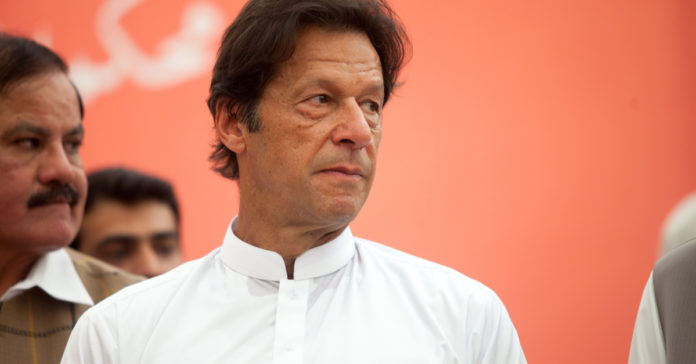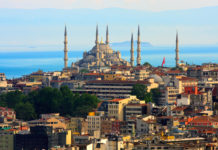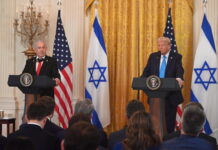As Pakistan turns 73, Jahangir Mohammed, of the Centre for Muslim Affairs, looks back at the country’s history of survival against the odds, war and nuclear power status. He argues that the road to the glorious Islamic homeland of its founding fathers will be a long and arduous one, but it is still possible.
On August 14, 1947, the largest mass migration the world had seen led to the creation of the new Muslim state of Pakistan at the end of a 100 years of direct British occupation of India.
India became two countries with Muslims partitioned among them, along with two competing Muslim political visions and ideals.
On the one side was the vision of Dr Allama Mohammed Iqbal and his idea of a separate Islamic state/homeland (the model being the Islamic State at Medina “Riasat Medina”) to protect the Muslims. On the other side was the “composite nationalism” model of co-existence of Islamic scholar Hussain Ahmad Madani.
The odds were stacked against the new state of Pakistan surviving, and certainly not for 73 years. Perhaps Pakistan’s major achievement in this period was its very survival.
It started with many disadvantages – it was not an ethnically/racially homogenous based state, such as Turkey, Iran or many other states created at the end of colonialism. It contained large populations of different ethnic groups who during a century of nationalism were bound to eventually identify and mobilise/solidify politically along ethnic group lines.
The country was also split geographically into East and West with a hostile India in between, which made governance near impractical and separation inevitable. The only unifying factor at the outset was Islam, but here again people were divided deeply along sectarian divisions – Barelwi/Sufi, Deobandi, Shia and later Wahabi/Salafi movements.
Subscribe to our newsletter and stay updated on the latest news and updates from around the Muslim world!
So a conflict that was to last 73 years was inbuilt at the birth of the new state. And the Muslims of Kashmir, who at that point mainly wanted to be part of Pakistan, were prevented military from expressing their desire, and looked to Pakistan for support.
Moreover, much of the administrative, governance and military infrastructure experience of local Indians, inherited from the British Raj, rested with the majority Hindu Indian side. Hindus had been preferred in such jobs and empowered during the British occupation.
India subsequently became an ally of the Soviet Union superpower which assisted it with its economic, political and military development. However, it also meant that the USA, the other superpower, would ensure Pakistan remained in its sphere of influence, without providing the development necessary for its survival, for which Pakistan gradually became reliant on China.
So Pakistan had to create its own political and military structures, if not entirely from scratch but from a low starting point.
Whilst the vision of an Islamic state along the Medina model was inspiring, there was no one with the practical political experience and knowledge to turn it into a reality at that time.
The British had done a great job of destroying traditional Islamic educational and religious institutions and the vision of Iqbal became translated practically and politically into a secular nationalist expression. In fact, the vision of Iqbal was later to inspire Farsi-speaking revolutionaries like Dr Ali Shariati and the Ayatollahs in Iran, more than it did the Urdu speaking leaders/scholars of Pakistan.
73 years of war and conflict
A strong centralised state and military was always going to be necessary to hold the country together. That was obvious from the early decades.
In the past 41 years Pakistan has been the focal point for superpower wars and has been on a war footing for most of its existence. The consequence of this state of war has been that Pakistan has become a powerful and experienced militarised state and a nuclear power.
The country’s history started with a war with India over Kashmir in 1947, and further wars over Kashmir in 1965 and 1999.
In between a failed political and military policy in the East of the country led to a disastrous war with the independence movement that had emerged there, leading to defeat to India, the loss of East Pakistan and the creation of the new Muslim state of Bangladesh.
In 1979, a pro-India Soviet Union invaded and occupied Pakistan’s neighbour on its other side, Afghanistan. A successful invasion would have meant Pakistan would inevitably be next in line and encircled by hostile forces on both its borders. The U.S. and West were not going to let that happen and Pakistan (along with the West) supported the mujahideen in Afghanistan and it became the key state in a struggle between global superpowers.
But Pakistan not only survived the 1979 Soviet Union invasion of Afghanistan, it helped reverse it and bring an end to the Soviet occupation in 1989. Consequently, Pakistan hosted millions of Afghani refugees and were left to manage them, as well as the jihadi infrastructure and thousands of fighters and their leaders from all over the world whose host countries mostly did not want them back, as well as a bitter factional civil war in Afghanistan fuelled by different countries.
Pakistan backed what it saw as the “stability option” in Afghanistan supporting the majority ethnic Pashtun Taliban into power in 1996. And both countries got caught up in a tit-for-tat revenge game between Osama Bin Laden and his fighters and the USA.
On September 11, 2001, Pakistan got caught up in an attack on the USA by supporters of Bin Laden and became the focus for another global war, the “War on Terror.” The Pakistani military sided with the U.S. and the West, using it also as an opportunity to remove the fighters left over after the jihad against the Soviet Union from its soil.
The emergence of the Pakistani Taliban and its violence inside Pakistan created havoc in the country. Pakistan’s participation in the War on Terror was at great loss to itself and damaged its standing globally among Muslims and Western countries.
Meanwhile, on the home front an ethnic Mohajir movement, the MQM (those who had migrated from India), complained of political discrimination and threatened secession from Pakistan in and around the Karachi area, fuelling violence and disorder.
Economic and political power
Whist Pakistan has become a modern military power, the consequence of that has been that its civil society, government, educational institutions, and economic development have fallen far behind.
The focus on military survival has allowed a corrupt politics to emerge and enabled large-scale theft of public money. And its politics has drifted between military rule and mostly family-based politics and government during its 73 years.
Moreover, aside from the defeat of the Soviet Union in Afghanistan, the achievement of Pakistan’s political objectives through use of warfare (direct and indirect) have been largely unsuccessful. It was defeated by India in 1971 and Kashmir has now been annexed by India; Afghanistan remains unstable and is now more pro-India; the “War on Terror” has simply fuelled Pashtun anger; and a push for separatism has emerged in Baluchistan and the Frontier regions.
In the coming decades Pakistan will have to focus on building its infrastructure, educational system, cleaning up its politics and realigning with its founding vision, whilst developing its natural resource base and tourism industries.
It will also have to find non-military solutions to the problems of Kashmir and Afghanistan, and ways of dealing with the rise of a Hindutva fascist India.
The United States and the West have also now fully gravitated and allied with India in a new emerging capitalist bloc against the latest superpower China. Pakistan, on the other hand, has moved closer towards its most loyal supporter during much of its existence, Communist China. The new superpower struggle between the USA and China will inevitably mean that Pakistan will remain a focus for superpower politics, rivalry, and military conflicts. In that sense Pakistan will have to continue to develop its military power and deal with more conflicts.
No Muslim state in the contemporary age can be deemed independent unless it becomes militarily, economically and politically strong and powerful and withstand external pressure.
The Pakistani state has survived 73 years in a period where others such as the Soviet Union, Eastern European States and Muslims states have not. That of itself is an achievement.
However, for Pakistan the road to independence and Medina is likely to be long and arduous one. If Pakistan can develop economically and politically, free of war and conflict, for the next couple of decades it may well yet reach its destination and emerge as a political and economic power in the region.






















